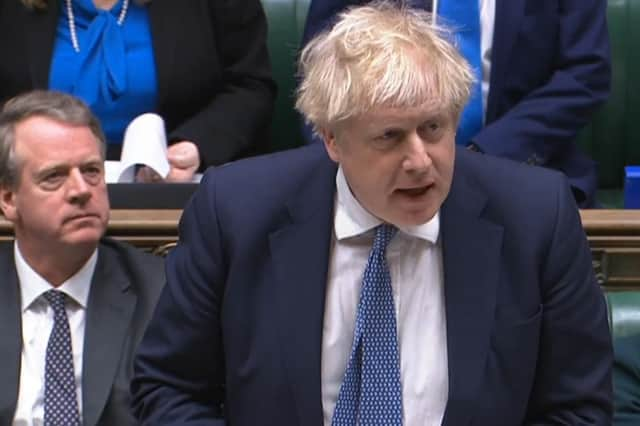Boris Johnson's attempt to smear Keir Starmer over Jimmy Savile sex abuse case was akin to QAnon conspiracy theory – Ayesha Hazarika


This week witnessed a new low for British politics. When the Prime Minister was meant to be apologising for Downing Street parties and the failure of leadership identified in Sue Gray’s report, he launched a deranged attack on Starmer, saying he was responsible for the failure to prosecute Jimmy Savile.
We know this is untrue. It’s on the record in a report. We know how low it is to weaponise sexual abuse, especially for Savile’s victims. We know this is the man who accused a child sex abuse inquiry of “spaffing money up the wall”.
Advertisement
Hide AdAdvertisement
Hide AdBut let’s be clear, this was a tactic no more sophisticated than yelling “you nonce” at Starmer and hoping it would stick because, in an era of unhinged conspiracy theories and social media, by the time the truth has got its boots on, the paedo meme is halfway round the world.
It’s right down there with the Obama birther or QAnon pizzagate conspiracies. It’s not even pound-shop Trump. It’s the full shebang.
Then Cabinet ministers walked a perilous tightrope, trying to defend Johnson while not repeating his actual words so they didn’t get sued. But for every one who had to debase themself that way, there were many more Tory MPs who felt ashamed. We saw strong words from Tobias Ellwood and Anthony Mangnall who submitted letters of no confidence. Mangnall tweeted: “Standards in public life matter.”
Standards matter because in these frightening times, we want to believe in politics. We need to. We want our leader to win the war against the pandemic and deal with the looming economic crisis.
We expect them to behave with decency. People do care about this, including many Conservatives. On the Jeremy Vine television show on Tuesday, I was shocked at the palpable anger from viewers, some who had voted Tory all their lives, about how Johnson had conducted himself.
Perhaps this is why we saw his insincere, unconvincing claim that when he attacked Starmer personally, in this most vile way, he didn’t actually mean to attack Starmer in the most vile way.
The whole thing is as pathetic as it is nasty. Smear. Double down. Send your lemming-like Cabinet ministers. Then back down. ‘Big Dog’ suddenly looks sheepish.
There are big questions for those ministers. What were they thinking? How can we trust people happy to defend a strategy with the most ludicrous lie at its heart?
Advertisement
Hide AdAdvertisement
Hide AdYou play a dangerous game when you use Steve Bannon’s playbook. As Mirza wrote in her resignation letter: “This was not the usual cut and thrust of politics; it was an inappropriate and partisan reference to a horrendous case of child sex abuse.”
I remember helping Labour figures prepare for Commons debates. Advisers would offer up what we thought were clever, funny or spicy attack lines against David Cameron. But there was always a line which Ed Miliband or Harriet Harman would never cross. Sometimes we’d moan they weren’t bullish enough.
But when I look back, it makes me proud to have worked for them. I wonder how many of those who advise Johnson can say the same.
A message from the Editor:
Thank you for reading this article. We're more reliant on your support than ever as the shift in consumer habits brought about by coronavirus impacts our advertisers.
If you haven't already, please consider supporting our trusted, fact-checked journalism by taking out a digital subscription.
Comments
Want to join the conversation? Please or to comment on this article.